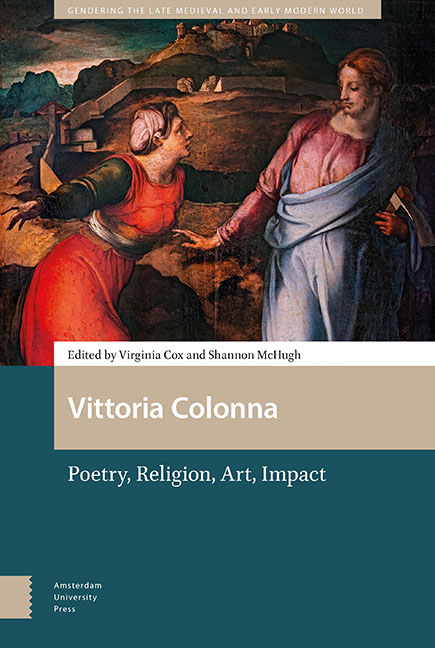Book contents
- Frontmatter
- Dedication
- Contents
- List of Illustrations
- Acknowledgements
- Introduction: The Twenty-First Century Vittoria Colonna
- Part 1 Literary and Spiritual Sociability
- Part 2 Widowhood
- Part 3 Poetry
- Part 4 Art
- Part 5 Readership
- Part 6 Impact
- Volume Bibliography
- Index of Citations of Colonna’s Letters and Verse
- Thematic Index
6 - ‘Ex illo mea, mi Daniel, Victoria pendet’: A Forgotten Spiritual Epigram by Vittoria Colonna
Published online by Cambridge University Press: 16 December 2021
- Frontmatter
- Dedication
- Contents
- List of Illustrations
- Acknowledgements
- Introduction: The Twenty-First Century Vittoria Colonna
- Part 1 Literary and Spiritual Sociability
- Part 2 Widowhood
- Part 3 Poetry
- Part 4 Art
- Part 5 Readership
- Part 6 Impact
- Volume Bibliography
- Index of Citations of Colonna’s Letters and Verse
- Thematic Index
Summary
Abstract
On 27 November 1537, the Ferrarese humanist Daniele Fini sent a Latin epigram to Vittoria Colonna, at that time residing in Ferrara. She responded a few months later with an epigram of her own, a poem that has been all but neglected in the scholarship. This essay aims to verify Colonna's authorship of the epigram through analysis of the manuscript against the historical details of the author's life and travels, as well as a comparison with the lexicon and themes of her vernacular rime spirituali.
Keywords: spiritual poems, Ferrara, Renaissance Latin poems, Reformation in Italy
A 221-page quarto manuscript on paper in the Biblioteca Comunale Ariostea in Ferrara (Cl. 1, 437) contains autograph writings by the Ferrarese humanist Daniele Fini (1460–c. 1550). Of particular interest is an epigram of five elegiac couplets at 208r, dated in the margin to 27 November 1537, authored by Fini and addressed ‘to the Divine Vittoria of the Aterno’.
Daniel Finus ad Divam Victoriam Aterninam
Ex te nomen habes victo Victoria mundo:
conveniens aliud non tibi nomen erat.
Illud ab effectu tibi congruit; indidit illud
en tibi, venturi praescia facta, parens.
Illecebras et opes et mundi commoda calcas;
quae tibi nunc vilis regia vestis erat
nunc ieiuna factos Davidis, Christique libellos
dextera, quae sceptrum ferre solebat, habet.
Si mundi es νίκη, quae sunt tibi praemia pugnae?
Mox mihi: ‘Post cinerea’, inquis, ‘Olympus erit’.
Daniele Fini to the Divine Vittoria of the Aterno
You take your name from yourself, Vittoria, because you are victorious over the world: no other name was fitting for you. That name befits you owing to your accomplishments; your mother, prescient of the future, bestowed it upon you. You disdain worldly enticements, riches and luxuries; you who once donned the robes of a queen now assume a humble habit. Your right hand, which once held a sceptre, now—thin from fasting—takes up the deeds of David and the books of Christ. If you are victor over the world, what rewards do you receive for your struggle? Straightaway you say to me: ‘After death comes Olympus’. The identification of this ‘Victoriam Aterninam’ with Vittoria Colonna is indisputable. First, the epithet Aternina derives from the Aterno river, which runs through Pescara. Throughout her life, Colonna referred to herself in writing as the ‘Marchioness of Pescara’ (Marchesa di Pescara), the title she acquired when she married Ferrante Francesco d’Avalos.
- Type
- Chapter
- Information
- Vittoria ColonnaPoetry, Religion, Art, Impact, pp. 135 - 152Publisher: Amsterdam University PressPrint publication year: 2021

